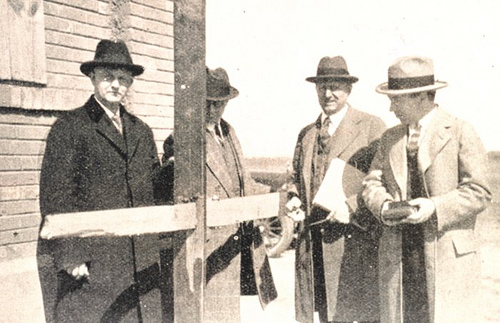
Cited in Epitaphiana: or, The Curiosities of Churchyard Literature, 1873.

Cited in Epitaphiana: or, The Curiosities of Churchyard Literature, 1873.
Northland and Southland were happy neighbors until yesterday, when Northland declared that a Southland dollar was to be worth only 90 Northland cents.
Not to be outdone, Southland declared that a Northland dollar would be worth 90 Southland cents.
I live in Centerville, on the border between the two countries. I go into a Northland store and buy a kazoo, which costs 10 cents. I pay for it with a Northland dollar and receive a Southland dollar as change.
Then I go across the street and enter a Southland store. There I buy a lemon, which also costs 10 cents. I pay for it with a Southland dollar and receive a Northland dollar as change.
When I get home I have my kazoo and lemon, for which it appears I’ve paid nothing. And each of the merchants has an additional 10 cents in his receipts.
So who paid for the kazoo and the lemon?
(From Eugene Northrop.)
Between 1834 and 1874, proud New Englander James Johns published the Vermont Autograph and Remarker, an irregular collection of history, essays, verse, and fiction. It was irregular because Johns wrote each issue in pen, in a beautifully lucid newspaper font with no erasures. Johns bought a small hand press in 1857 but rarely used it — he found he was actually faster with the quill.
In January 1890, a tremendous blizzard struck the Sierra Nevada, paralyzing a Southern Pacific Railroad train and trapping its 600 passengers in their cars for three weeks. On Jan. 31 one of them, George T. McCully, began publishing a newspaper, the Snowbound, “issued every week-day afternoon by S. P. Prisoner in Car No. 36, blockaded at Reno, Nevada.” We know that McCully offered to sell copies of the hand-penciled four-page daily for 25 cents each; it’s not clear whether he got past the first issue. Perhaps he ran out of paper.
xenium
n. a gift given to a guest
From Henry Dudeney:

“Place six matches as shown, and then shift one match without touching the others so that the new arrangement shall represent an arithmetical fraction equal to 1. The match forming the horizontal fraction bar must not be the one moved.”
This walking hero [Daniel Crisp] on Sept. 21, 1802, walked one mile in seven minutes and fifty seconds, on the City-road, London.—July 16, 1817, commenced walking backwards forty miles daily for seven days, and completed 280 miles by that retrograde motion, on Wormwood Scrubs, near London, one hour and a quarter within the given time, to the surprise of thousands who witnessed the performance. … April 23, 1818, commenced walking from London to Oxford, to and fro by way of Datchet, Windsor, and Henley, the distance of sixty-one miles daily for seventeen successive days, and completed the 1037 miles on the 9th of May at eight minutes after eleven at night, being fifty-two minutes within the given time; during the performance of this arduous undertaking it rained heavily for ten days, which caused the Thames to overflow on the road to the depth of two feet and a half, and a quarter of a mile in length, which he was obliged to walk through for five days.
— Pierce Egan, Sporting Anecdotes, Original and Selected, 1822

The Tri-State Tornado of 1925 traveled 200 miles through the American Midwest, killing nearly 700 people.
Along the way, it drove a 1×5-inch board through a 2×6-inch plank.
If you’re a woman and want to humiliate a man, invite him to watch you do this:
Now challenge him to do the same. If he’s like most men he’ll get stuck on step 6. The common explanation is that men’s hips are built differently; they also have proportionally bigger feet. Either way, you can easily pick his pocket while he’s struggling there.
“It is astonishing that there should still be found today people who do not believe that there are witches.” — Henry Bouget, 1602

Canadian cats have their own parliament. In the same precinct of Ottawa where the human legislature meets, Irène Desormeaux erected a feline equivalent in the 1970s. The cats are all spayed or neutered, they get free inoculations and medical care, and the whole thing is run by volunteers using personal donations.